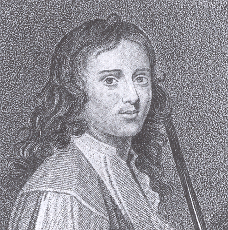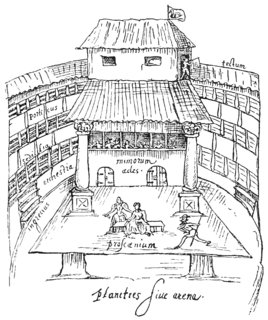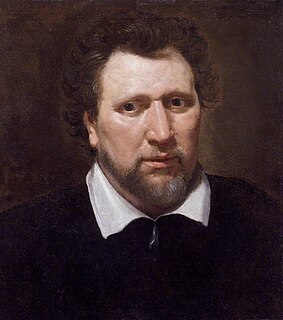Rollo Duke of Normandy, also known as The Bloody Brother, is a play written in collaboration by John Fletcher, Philip Massinger, Ben Jonson, and George Chapman. The title character is the historical Viking duke of Normandy, Rollo. Scholars have disputed almost everything about the play; but it was probably written sometime in the 1612–24 era and later revised, perhaps in 1630 or after. In addition to the four writers cited above, the names of Nathan Field and Robert Daborne have been connected with the play by individual scholars.
The King's Men was the acting company to which William Shakespeare (1564–1616) belonged for most of his career. Formerly known as The Lord Chamberlain's Men during the reign of Queen Elizabeth I, they became The King's Men in 1603 when King James I ascended the throne and became the company's patron.

Michael Mohun was a leading English actor both before and after the 1642—60 closing of the theatres.
Charles Hart was a prominent British Restoration actor.
Prince Charles's Men was a playing company or troupe of actors in Jacobean and Caroline England.
William Hart was an English actor during the reign of Charles I and purportedly the father of the Restoration actor Charles Hart.
Queen Henrietta's Men was an important playing company or troupe of actors in Caroline era in London. At their peak of popularity, Queen Henrietta's Men were the second leading troupe of the day, after only the King's Men.
Theophilus Bird, or Bourne, was a seventeenth-century English actor. Bird began his stage career in the Stuart era of English Renaissance theatre, and ended it in the Restoration period; he was one of the relatively few actors who managed to resume their careers after the eighteen-year enforced hiatus (1642–60) when the theatres were closed during the English Civil War and the Interregnum.

The Duke's Company was a theatre company chartered by King Charles II at the start of the Restoration era, 1660. Sir William Davenant was manager of the company under Prince James, Duke of York's patronage. During this period, theatres began to flourish again after being closed due to restrictions throughout the Interregnum and English Civil War.
Andrew Pennycuicke was a mid-seventeenth-century actor and publisher; he was responsible for publishing a number of plays of English Renaissance drama.
King's Men personnel were the people who worked with and for the Lord Chamberlain's Men and the King's Men from 1594 to 1642. The company was the major theatrical enterprise of its era and featured some of the leading actors of their generation — Richard Burbage, John Lowin, and Joseph Taylor among other — and some leading clowns and comedians, like Will Kempe and Robert Armin. The company benefitted from the services of William Shakespeare, John Fletcher, and Philip Massinger as regular dramatists.
William Robbins, also Robins, Robinson, or Robson, was a prominent comic actor in the Jacobean and Caroline eras. During the English Civil War he was a captain in the Royalist army and was killed during the Siege of Basing House.
William Allen was a prominent English actor in the Caroline era. He belonged to both of the most important theatre companies of his generation, Queen Henrietta's Men and the King's Men.
Walter Clun was a noted English actor of the seventeenth century. His career spanned the difficult period when the theatres were closed during the English Civil War and the Interregnum, from 1642 to 1660.
Nicholas Burt, or Birt or Burght among other variants, was a prominent English actor of the seventeenth century. In a long career, he was perhaps best known as the first actor to play the role of Othello in the Restoration era.
William Wintershall, also Wintersall or Wintersell, was a noted seventeenth-century English actor. His career spanned the difficult years of mid-century, when English theatres were closed from 1642 to 1660, during the English Civil War and the Interregnum.
Alexander Gough, also Goughe or Goffe, was an English actor in the Caroline era. He started out as a boy player filling female roles; during the period of the English Civil War and the Interregnum (1642–1660) when the theatres were closed and actors out of work, Gough became involved in the publication of plays.

William Cartwright was an English actor of the seventeenth century, whose career spanned the Caroline era to the Restoration. He is sometimes known as William Cartwright, Junior or William Cartwright the younger to distinguish him from his father, another William Cartwright, an actor of the previous generation.











